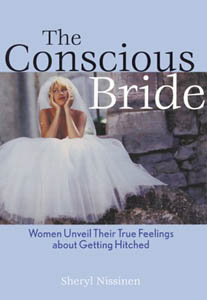![[Metroactive News&Issues]](/gifs/news468.gif)
[ San Jose | Metroactive Central | Archives ]
 Runaway Brides
Runaway Brides
Wedding jitters not just a male thing
By Genevieve Roja
THE SIGNS CAME IN CLEARER than those provided by a Magic Eight Ball. First, there were the ants, then the pestilence and finally a burning cafe. "It was a disaster from the start," recalls June Sunga, a stunning, 25-year-old Filipina with jet-black hair, almond-shaped eyes and a dimpled smile. For Sunga and her fiancé, Michael, it was supposed to be a romantic getaway in Calistoga. But when they arrived at their cushy bed-and- breakfast, the pair discovered ants marching through their room. Before dinner, where he was supposed to propose and present June's platinum and diamond ring, Michael came down with a 100-degree fever. As they walked downtown the next morning, the cafe where they drank coffee a day earlier had burned to the ground. "I remember saying to myself, I wonder what this means as far as our relationship goes," Sunga says. A month and a half before they were to be married, Sunga and Michael called it off. On the surface, the two were a perfect match. And unlike many grooms who pass the brunt of wedding responsibilities to their bride, Michael cooperated. He called the florist, talked to the caterer and scheduled cake tastings. But in private they were arguing over things that didn't matter much when they weren't engaged. He suddenly didn't approve of her plans to earn her college degree. She felt he was too homebound, while she wanted to spend her weekends with girlfriends, going dancing in the city. He kept digging up the past, asking June who she dated during their yearlong breakup. Finally they sat down and had a logical talk about their impending marriage, wondering just how compatible they were after 11 years of dating and four years living together. He talked about postponing the wedding; she talked about postponing the inevitable--that they weren't going to marry at all. "We weren't in the right mind frame," Sunga says. "[Getting married] wasn't the right thing to do. We just didn't love each other anymore." So they did what other broken couples have done, inform parents and friends, return presents, call the priest, the caterer, the band, the DJ, invited guests. Everyone seemed to understand, except one bridesmaid who ranted about lost money on her dress and shoes. There was some remorse, but Sunga felt she had done the right thing. In fact, all of Sunga's feelings--lament over an altered lifestyle, loss of identity, anger and confusion--were normal and expected, according to Sheryl Nissinen, bridal counselor and author of The Conscious Bride. Using anonymous women to recount the nuances of their wedding journeys, Nissinen provides expert commentary on everything from the proposal to the ceremony to the first year of marriage. She even writes about conflicts similar to June and Michael's: "... the reality is that transitional times bring all issues to the surface, and the feelings between bride and groom range from stilted tension to full-blown fights, from a quiet separateness to a tingly love." Perhaps the larger message of the book is acknowledging that marriage is a rite of passage not to be taken lightly. It's not about creating the most perfect wedding day, but about creating a lasting and loving marriage. And brides--like it or not--need advice from the wise ones. "We need guides, people that have gone through it before us--mothers, girlfriends, sisters," says Nissinen, whose book evolved from her master's thesis, which became the catalyst for her bridal counseling program, Conscious Weddings. "[Use] people who you feel you can talk to about the difficult side of this; that's ideal." Nissinen also says that brides and wedding party members who dismiss the proverbial "cold feet" and general prewedding trepidation with nonchalance are in danger of repressing feelings. There's also a glaring difference in how men and women are perceived. "Men have an outlet to express feelings of fear and loss," says Nissinen, who wrote the book in part because she herself couldn't find material addressing her jitters during her engagement. "They refer to their wedding as their funeral. They're tapping into this element of their loss, [but] they're also tapping into what they're gaining is something that's wonderful and beautiful." The all-important question that Nissinen says to ask oneself is reflective: "Who is this wedding for?" Strip the wedding of flowers, head counts and reception sites. Put aside a parent's feelings. Forget what friends and relatives will think. Take time to allow prewedding feelings in as much as possible. "The ones that have the most satisfying day are those that express who they are and the love they are celebrating," Nissinen says. "If that means to have a smaller wedding or taking that $15,000 that your parents are offering, you will have a more satisfying wedding day." For more information about The Conscious Bride or Nissinen's bridal counseling program, visit www.consciousweddings.com. [ San Jose | Metroactive Central | Archives ]
|
From the February 22-28, 2001 issue of Metro, Silicon Valley's Weekly Newspaper.
Copyright © 2001 Metro Publishing Inc. Metroactive is affiliated with the Boulevards Network.
For more information about the San Jose/Silicon Valley area, visit sanjose.com.